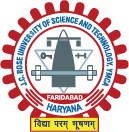POST GRADUATE PROGRAM( M.Tech in Power Electronics and Drives)
PROGRAM OUTCOMES(POs)
- An ability to independently carry out research /investigation and development work to solve practical problems of Power Electronics and Drives.
- An ability to write and present a substantial technical report/document/research paper.
- Students should be able to demonstrate a degree of mastery in the area of Power Electronics & Drives. The mastery should be at a level higher than the requirements in the appropriate bachelor program of Electrical Engineering.
- An ability to use research based knowledge and research methods including design of controllers, analysis and implementation for the solution of complex problem in the field of Power Electronics & Drives
- An ability to develop and apply emerging techniques for the analysis of problems related to Power Electronics & Drives.
- An ability to apply the acquired knowledge to assess societal, safety, ethical issues and subsequently design/develop electrical equipments and systems.
PROGRAM SPECIFIC OUTCOMES(PSOs)
- Apply technical concepts for designing, developing and implementation of Power Electronics controllers using emerging technologies.
- Apply the technical skills in solving the real world problems relevant to social, ethical, economic and environment issues in the emerging fields of Power Electronics and Drives.
PROGRAM EDUCATIONAL OBJECTIVES (PEOs)
- To produce Power Electronics & Drives post graduates, who are employable in public and private industries/ Institutes/Organization, or pursue higher education.
- To prepare post graduates who have the ability to identify and address current and future problems in the domain of Power electronics and drives.
- To inculcate research attitude and lifelong learning among the Post graduates.
UNDER GRADUATE PROGRAM( B.Tech in Electrical Engineering)
PROGRAM OUTCOMES (POs)
Engineering Graduates will be able to:
- Apply the knowledge of mathematics, science, electrical engineering fundamentals, and an electrical engineering specialization to the solution of complex electrical engineering problems.
- Identify, formulate, review research literature, and analyze complex electrical engineering problems reaching substantiated conclusions using first principles of mathematics, natural sciences, and engineering sciences.
- Design solutions for complex electrical engineering problems and design system components or processes that meet the specified needs with appropriate consideration for the public health and safety, and the cultural, societal, and environmental considerations.
- Use research-based knowledge and research methods including design of experiments, analysis and interpretation of data, and synthesis of the information to provide valid conclusions.
- Create, select, and apply appropriate techniques, resources, and modern engineering and IT tools including prediction and modelling to complex electrical engineering activities with an understanding of the limitations.
- Apply reasoning informed by the contextual knowledge to assess societal, health, safety, legal and cultural issues and the consequent responsibilities relevant to the professional engineering practice.
- Understand the impact of the professional electrical engineering solutions in societal and environmental contexts, and demonstrate the knowledge of, and need for sustainable development.
- Apply ethical principles and commit to professional ethics and responsibilities and norms of the engineering practice.
- Function effectively as an individual, and as a member or leader in diverse teams, and in multidisciplinary settings.
- Communicate effectively on complex engineering activities with the engineering community and with society at large, such as, being able to comprehend and write effective reports and design documentation, make effective presentations, and give and receive clear instructions.
- Demonstrate knowledge and understanding of the engineering and management principles and apply these to one’s own work, as a member and leader in a team, to manage projects and in multidisciplinary environments.
- Recognize the need for, and have the preparation and ability to engage in independent and life-long learning in the broadest context of technological change.
PROGRAM SPECIFIC OUTCOMES (PSOs)
- To empower the students of Electrical Engineering with professional and competitive skills by the integration of regular academic and Industry interaction as per the needs of industry.
- To incorporate research environment and innovation projects towards assimilation of global technology in order to meet needs of automation and articulate a higher education system of ethics and mind set for a realistic education.
PROGRAM EDUCATIONAL OBJECTIVES (PEOs)
- To produce competent electrical engineering graduates with a strong foundation design, analytics and problem solving skills for successful professional careers in industry, research and public service.
- To provide a stimulating research environment so as to motivate the students for higher studies and innovation in the specific and allied domains of electrical engineering.
- To encourage the graduates to practice the profession following ethical codes, social responsibility and accountability.
- To train students to communicate effectively in multidisciplinary environment.
- To imbibe an attitude in the graduates for life-long learning process.





